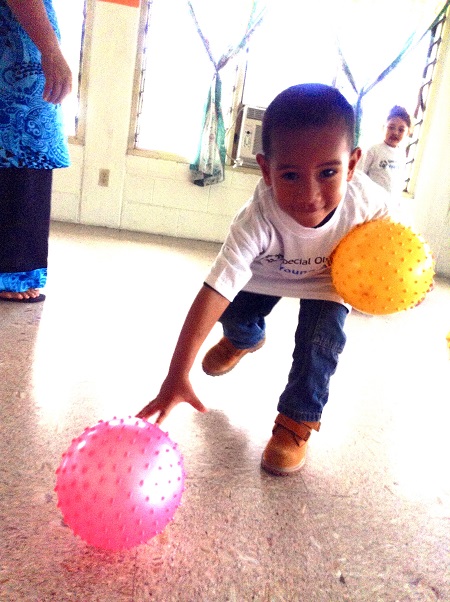
The University Center for Excellence in Developmental Disabilities (UCEDD) held a training recently to familiarize stakeholders with Play Therapy, a new strategy to help young children with or without disabilities develop motor skills appropriate to their age. (Courtesy Photo)

The University Center for Excellence in Developmental Disabilities (UCEDD) held a training recently to familiarize stakeholders with Play Therapy, a new strategy to help young children with or without disabilities develop motor skills appropriate to their age. (Courtesy Photo)
UCEDD Promotes Play Therapy for Daycares
December 8, 2015
By Moresa Langkilde, UCEDD
Many children grow into intelligent, unique individuals capable of conducting any physical task given to them, but what about those who have delays in their development? What about those whose motor skills are not developed by their appropriate age? If this is not identified early, it could affect them greatly in the long run.
The University Center for Excellence on Developmental Disabilities (UCEDD), a program under the American Samoa Community College (ASCC), in collaboration with the Department of Human and Social Services Child Care Division, held a two-day early intervention training session, Play Therapy for Child Care Providers, on December 3rd . The purpose of the training was to share some of the existing problems that impact a child’s development, how these will impact them when starting school, and various strategies that can be used to assist children to develop motor skills appropriate to their age.
American Samoa faces a limited number of physical and occupational therapists to serve children who are referred, leaving a large population of children unidentified and underserved from developing to their fullest. In a roundtable discussion, providers shared that children need more activities to enhance their motor skills so that when they start Early Childhood Education (ECE) they are prepared to learn.
It is important for children with or without a disability to develop various motor skills using their muscles and movement as early in life as possible. When children who have yet to develop appropriate motor skills start school, not all will be identified or receive early intervention services. Fine motor skills enable actions such as holding a pencil, while gross motor skills that involve balance assist them in dressing for school or carrying a backpack.
Day two of the training took place at the Leomiti family guesthouse in Pavaiai, where participants demonstrated play activities in an obstacle course of games to promote hand and eye coordination, muscles and reflexes that they do not use on a daily basis, sensory skills and balancing, to name a few. These activities can also improve their cognitive, physical and intellectual development. If used early in life and on a daily basis in the classroom, daycare and home, these activities help diminish delays in development and dependency. Through the use of individual play therapy, group play therapy and in-home therapy, the child and family learn coping skills, improve the parent-child interaction and increase self-awareness, all of which benefit the family system as a whole. The caregiver of Lanialofa Daycare, Foua Emani stated that she loved the setup of all the activities at the training. Emani said the training gave her new ideas on how to implement the activities in her daycare for Sports Day Fridays.
The UCEDD uses the Special Olympics Young Athletes’ Model as an early intervention activity, and has found that even with limited resources available, it is a great way to engage the attention of children. Participants and children from Manumalo Daycare, Lanialofa Daycare, Victory Chapel Daycare were full of energy, according to the volunteers from the ASCC Psychology Club who engaged the children in activities., The daycare providers, excited and grateful for the training, expressed that it was something new and fun for the kids!
The UCEDD acknowledges that the training for the children and service providers would not have been possible without the collaboration of DHSS Child Care Division Assistant Director Louisa Te’o Tuiteleleapaga and Child Care Division Provider Services Team Manager Luana Roberts-Tavale. For more information on different activities for Play Therapy please contact Tafaimamao Tua-Tupuola or Moresa Langkilde at ucedd@amsamoa.edu or phone 699-9155 ext. 487.
